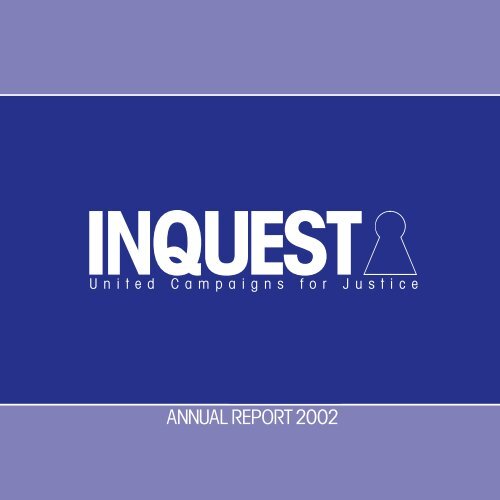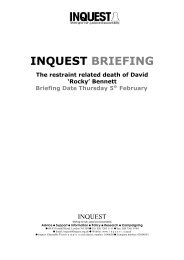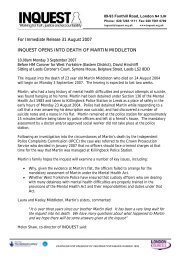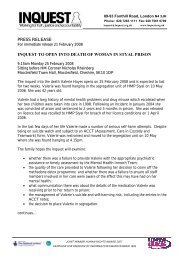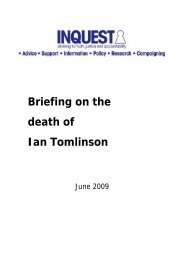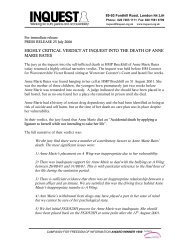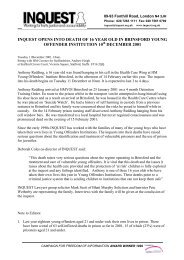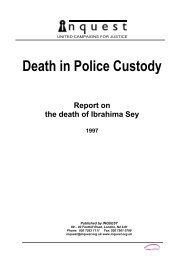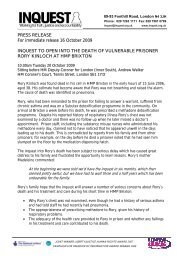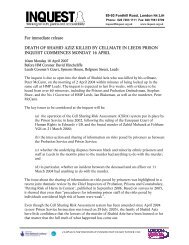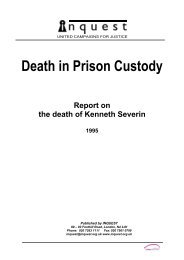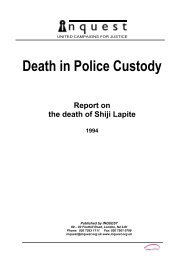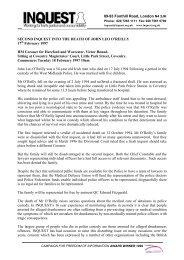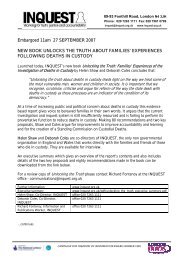ANNUAL REPORT 2002 - Inquest
ANNUAL REPORT 2002 - Inquest
ANNUAL REPORT 2002 - Inquest
Create successful ePaper yourself
Turn your PDF publications into a flip-book with our unique Google optimized e-Paper software.
INQUEST<br />
United Campaigns for Justice<br />
<strong>ANNUAL</strong> <strong>REPORT</strong> <strong>2002</strong>
The <strong>Inquest</strong> Charitable Trust<br />
The <strong>Inquest</strong> Charitable Trust was set up in 1995 to<br />
complement and assist the work of its sister organisation,<br />
INQUEST. It is a registered charity (number 1046650)<br />
and a company limited by guarantee. Through a<br />
management agreement with INQUEST, it provides funds<br />
to enable the INQUEST staff team to carry out the Trust’s<br />
aims and objectives. The Trust seeks to provide advice and<br />
support for bereaved families facing an inquest, to ensure<br />
proper legal representation at a Coroner’s Court and to<br />
research and disseminate information concerning sudden<br />
or unexplained deaths. INQUEST reports regularly to the<br />
Trust on work undertaken. Although a relatively new<br />
organisation, the Trust builds upon longstanding support<br />
for bereaved people that has been a feature of INQUEST’s<br />
work since its inception in 1981.<br />
INQUEST CHARITABLE TRUST BALANCE SHEET as at 31 March <strong>2002</strong><br />
<strong>2002</strong> 2001<br />
£ £ £ £<br />
CURRENT ASSETS<br />
Debtors – 2,020<br />
Cash at bank and in hand 5,434 278<br />
5,434 2,298<br />
CURRENT LIABILITIES<br />
Creditors: amount falling due<br />
within one year (2,625) (588)<br />
NET CURRENT ASSETS 2,809 1,710<br />
NET ASSETS 2,809 1,710<br />
FUNDS<br />
Restricted funds 500 –<br />
Unrestricted funds 2,309 1,710<br />
2,809 1,710<br />
A full signed copy of accounts is available from <strong>Inquest</strong> Charitable Trust<br />
TRUSTEES OF INQUEST CHARITABLE TRUST:<br />
Dr Tony Ward, Chair, Lecturer in Law, De Montfort University, Leicester<br />
David Bergman, Director, Centre for Corporate Accountability<br />
Prof Penny Green, School of Law, University of Westminster<br />
Erin Pizzey, Family member<br />
Mark Scott, Partner, Bhatt Murphy Solicitors<br />
Leslie Thomas, Barrister, Two Garden Court Chambers<br />
2
INQUEST<br />
INQUEST is the only non-governmental organisation in<br />
England and Wales that works directly with the families<br />
and friends of those who die in custody. We provide an<br />
independent free legal and advice service to bereaved<br />
people on inquest procedures and their rights in the<br />
Coroner’s Court. We provide specialist advice to<br />
lawyers, bereaved people, advice agencies, policy<br />
makers, the media and the general public on<br />
contentious deaths and their investigation.<br />
INQUEST was set up in 1981 following a number of<br />
controversial deaths in police and prison custody.<br />
Deaths in custody remain the main focus of<br />
INQUEST’S work.<br />
INQUEST also works around other controversial<br />
deaths, including:<br />
• deaths in psychiatric and special hospitals<br />
• deaths at work<br />
• deaths involving health and safety issues, such as<br />
major disasters and carbon monoxide poisoning<br />
• deaths that raise specific legal issues for the inquest<br />
system, and any legal action that may follow.<br />
Issues raised often involve:<br />
• negligence<br />
• institutional violence and inhumane treatment<br />
• abuse of human rights<br />
• state and corporate accountability.<br />
INQUEST also provides advice and information for<br />
anyone facing an inquest and has unparalleled<br />
experience and knowledge of the inquest system.<br />
INQUEST aims to:<br />
• provide support and information to bereaved friends<br />
and families facing an inquest<br />
• campaign for more rights for bereaved people<br />
• reform the inquest system and the process by which<br />
deaths are investigated<br />
• monitor controversial deaths and their investigation<br />
• research, publish and make available information on<br />
controversial deaths<br />
• ensure that the experiences of families arising from<br />
casework directly influence our policy work,<br />
campaigning and lobbying<br />
• ensure greater corporate and state accountability<br />
and<br />
• reduce the number of controversial deaths.<br />
INQUEST STAFF:<br />
Deborah Coles, Co-Director<br />
Helen Shaw, Co-Director<br />
Gilly Mundy, Senior Caseworker<br />
Zainab Kemsley, Part time Caseworker (started September <strong>2002</strong>)<br />
Melanie Lowe, Office Manager<br />
Richard Fontenoy, Part time Information Worker<br />
VOLUNTEERS:<br />
Matt Davis<br />
Paul Lennon<br />
Ugochi Okoronkwo<br />
Chloë Smythe<br />
Gavin Carroll<br />
EXECUTIVE COMMITTEE MEMBERS 2001 –<br />
Louise Christian, Chair – Partner, Christian Khan Solicitors<br />
Adam Sampson, Deputy Chair – Director, Shelter<br />
Reverend Arlington Trotman, Churches Commission for Racial Justice<br />
Dr Joanna Bennett, Family member, Lecturer at South Bank University<br />
Adrienne Jemmott, Family member<br />
Leslie Thomas, Barrister, Two Garden Court Chambers<br />
3
Losing our son in police custody has been an<br />
earth shattering experience.We would like to<br />
pay tribute to INQUEST for the support they<br />
have given us from the outset.<br />
“■ Family of Roger Sylvester<br />
“<br />
“<br />
Throughout all this trauma, the only people to offer<br />
comfort and reassurance, insight and advice have been<br />
the INQUEST organisation. Without them, I don’t know<br />
what the outcome of all this would have been, as at times<br />
I have plumbed the very depths of despair and at times<br />
when my family have needed support, I have been unable<br />
to give it as I have been too involved trying to exorcise<br />
my own demons to be of use to someone else.<br />
■ Brother of a man who died in prison<br />
“<br />
I fight on to find the truth for<br />
my son. I would like to thank<br />
you for the help and advice “INQUEST gave me.<br />
“<br />
INQUEST ADVISORY GROUP<br />
Professor Joe Sim, Liverpool John Moores University<br />
Professor Phil Scraton, Centre for Studies in Crime and Social Justice,<br />
Edge Hill College<br />
Tim Owen QC, Matrix Chambers<br />
Professor Mick Ryan, Greenwich University<br />
Ruth Bundey, Partner, Harrison, Bundey & Co, Solicitors<br />
Dr Richard Stone, advisor to Lawrence Inquiry<br />
Jane Winter, Director, British Irish Rights Watch<br />
Asad Rehman, Amnesty International and Newham Monitoring Project<br />
Raju Bhatt, Partner, Bhatt Murphy Solicitors<br />
Jonathon Glasson, Barrister, Doughty Street Chambers<br />
4
Chair’s report Louise Christian<br />
This year has seen the final fulfilment of many years of<br />
campaigning by INQUEST for a fundamental review by<br />
government of the whole inquest system. It is too early to<br />
tell what will be in the Coroners Review Team report and<br />
whether the government will accept the<br />
recommendations made. However, INQUEST can be<br />
justly proud both of its decisive role in securing this<br />
review and of the contribution it has made throughout<br />
the second half of the year in helping to feed in<br />
information to the Review. The hardworking staff of<br />
INQUEST and the tireless campaigners associated with<br />
the organisation, many of them bereaved families with<br />
direct experience of the system, have devoted much time<br />
to ensuring that the Review Team understand the<br />
numerous ways in which the system currently fails to<br />
deliver justice or fulfil our reasonable expectations of it in<br />
relation to controversial deaths. INQUEST is grateful to<br />
the members of the Coroners Review Team for listening<br />
to our concerns with great attention and allowing us the<br />
opportunity of debating with them fully and frankly. We<br />
hope that they will be courageous in their conclusions<br />
and that the government in implementing them will<br />
recognize the need to devote substantially more resources<br />
to the investigation of controversial deaths.<br />
On the negative side the year has also seen a gross<br />
failure to learn lessons in contentious police custody death<br />
cases. The secrecy and delay which have characterized the<br />
investigations into the deaths of Harry Stanley,<br />
Christopher Alder and Roger Sylvester among others have<br />
undoubtedly prolonged the agony suffered by their<br />
families and have increased the perception that the system<br />
is designed to prevent bereaved families in these cases<br />
from discovering the truth of what happened.<br />
The year has also seen a further surge in the prison<br />
population and the highest ever number of self inflicted<br />
deaths in prison with record numbers of young people and<br />
women killing themselves. Suicide prevention and prison<br />
overcrowding are simply incompatible and this dismal<br />
record should be a matter of national shame and prompt<br />
urgent reform. We hope to be able to make a significant<br />
contribution in our forthcoming new research on suicides<br />
by young people which has been funded by The Diana,<br />
Princess of Wales Memorial Fund.<br />
The need for the work that INQUEST does has never<br />
been greater and we are pleased that this is being<br />
recognized by our funding supporters. Next year will be<br />
DIARY OF<br />
THE YEAR<br />
Some of the key events for<br />
INQUEST in <strong>2002</strong><br />
JANUARY<br />
Meet with Chair of Metropolitan<br />
Police Authority Toby Harris<br />
and Deputy David Muir about<br />
issues concerning deaths in<br />
police custody.<br />
Attend public meeting of<br />
Metropolitan Police Authority<br />
members on deaths in police<br />
custody in London with a<br />
number of families<br />
Attend Roger Sylvester preinquest<br />
hearing; liaise with<br />
family and lawyers; coordinate<br />
press<br />
5
an exciting year for us as we start work on the new project<br />
on youth deaths in prisons and complete the next phase of<br />
the research project on the investigation of contentious<br />
deaths and the treatment of bereaved families. We will<br />
also continue to contribute to the Coroners Review and to<br />
do all the individual casework with families which makes<br />
INQUEST such a vital resource for the families, lawyers<br />
and others involved. Meanwhile the recent move to better<br />
premises and the expansion of the number of people<br />
employed, now four full time and two part time, means<br />
that we are better equipped to take on the new challenges<br />
which face us and that staff at long last have better<br />
working conditions.<br />
I would like to thank all of INQUEST’s staff and<br />
management committee and everyone else who has helped<br />
us in the past year.<br />
Submit response to Home<br />
Office paper on definitions of<br />
deaths in police custody<br />
FEBRUARY<br />
Host visit from members of the<br />
Commonwealth Human Rights<br />
Initiative<br />
Attend meeting with<br />
Department of Health<br />
regarding concerns about the<br />
case of Rocky Bennett who<br />
died in psychiatric detention<br />
Attend Court of Appeal hearing<br />
on the call for a public inquiry<br />
into death of Zahid Mubarek<br />
6
Co-Directors’ Report <strong>2002</strong> Deborah Coles and Helen Shaw<br />
INQUEST promotes the interests of families whose relatives<br />
die in custodial or other contentious situations. The past year<br />
has seen the continuing need for our service to help bereaved<br />
people, all too often disadvantaged by the system, to be<br />
heard and empowered, and to maximise their opportunity to<br />
find out the truth about how their relative died.<br />
We have ensured that the collective experience of<br />
bereaved people has impacted on the debate on the future<br />
of the inquest system, which has been subjected to scrutiny<br />
by way of the Home Office fundamental review of the<br />
Coroner’s system. Through co-ordinating meetings with<br />
users of our service – families and lawyers – and requesting<br />
regular meetings with members of the Coroners Review<br />
Team, we feel we have successfully put forward INQUEST’s<br />
critique of the inquest system. However, much will depend<br />
on how much of a priority this issue is for government, as it<br />
will require the political will to implement the fundamental<br />
changes that are needed.<br />
Once again we report that the lessons supposedly learnt<br />
from previous deaths in police custody have been ignored.<br />
This begs questions of how willing the state is to take these<br />
deaths seriously despite various reviews and comments by<br />
Government Ministers. The inadequacy of current inquiries<br />
into custodial deaths still allows the State to avoid<br />
responsibility and forces families to have to struggle for the<br />
truth in the face of secrecy, delay and inequality of<br />
resources.<br />
At a time when there has been significant attention on<br />
deaths in custody and the way in which they are investigated<br />
a number of cases have again highlighted the fundamental<br />
changes that are needed at every stage of the investigation<br />
process: the collapse of the trial of the police officers<br />
involved in the death of Christopher Alder and the current<br />
secret internal inquiry into the CPS handling of the case; the<br />
appalling conduct of the coroner at the inquest into the<br />
death of Harry Stanley, the unarmed man shot dead by<br />
Metropolitan police; the reprehensible treatment of the<br />
family of Roger Sylvester who are still waiting to discover<br />
the truth about his restraint-related death four years on; and<br />
the restraint-related death of Giles Freeman, a mentally ill<br />
man who died after being restrained by Thames Valley police<br />
where there was a failure by both the police force involved<br />
and the Police Complaints Authority to respond to the<br />
seriousness of the case. These cases show that in the most<br />
controversial cases there is a wilful failure to address the<br />
whole investigation process and points to a shameful system<br />
Present seminar at National<br />
Assembly Against Racism post<br />
Stephen Lawrence Inquiry<br />
conference<br />
Attend launch of Stone<br />
Ashdown Trust new office<br />
MARCH<br />
Attend Liberty Research project<br />
Advisory Group<br />
Write and present paper at<br />
Prison Reform Trust conference<br />
on women prisoners and<br />
mental health<br />
8
that does not allow an open independent and transparent<br />
inquiry and fails to subject these deaths and the issues they<br />
raise about the police use of force to proper public scrutiny.<br />
Last year saw an unprecedented number of self-inflicted<br />
deaths in prison, 94, the highest ever. Whilst overcrowding<br />
is a contributory factor many of the inquests we attend<br />
highlight the inappropriate use of prison for people,<br />
particularly those with mental health, drug and alcohol<br />
problems and the failure of the prison system to safely care<br />
for those in its custody – as well as the harsh and<br />
impoverished regimes and conditions that operate in many<br />
prisons. The high number of Irish deaths in Brixton prison<br />
has raised the issue of anti-Irish racism and the slow<br />
response of the authorities to address this matter. We<br />
remain alarmed at the number of deaths of young people<br />
and children in prison and Government policies that are<br />
resulting in more young people being sent to prison.<br />
INQUEST has been working closely with those involved in<br />
the children’s rights and penal reform field to contribute our<br />
findings to joint projects. We will begin a three-year project<br />
funded by The Diana, Princess of Wales Memorial Fund on<br />
drawing together the issues raised by these deaths and the<br />
needs and rights of bereaved families, in particular the<br />
siblings of those who die. Investigations into these deaths<br />
are still too concerned with the individual pathology of the<br />
deceased and designed to deflect criticism from the Prison<br />
Service rather than as an investigation designed to uncover<br />
any failings and learn the lessons. Prison deaths must be<br />
independently investigated outside of the Prison Service and<br />
those associated with it.<br />
Deaths of women in prison have also risen to an<br />
unacceptable level and raise particular concerns about the<br />
escalating incarceration of women. We were deeply<br />
saddened by the death this year of Chris Tchaikovsky, the<br />
director and founder of Women in Prison, whose persistent<br />
work did so much to bring to public attention the issues of<br />
women’s imprisonment. Her joint campaigning work with<br />
INQUEST on the suicides and self-harm of women was<br />
crucial and we will continue to campaign to ensure that the<br />
deaths of women are not invisible.<br />
In 2003 we will work on our Nuffield-funded research<br />
specifically on developing models of good practice in<br />
relation to controversial deaths and the treatment of<br />
bereaved people. This will allow us the time and space to<br />
look at comparative systems of investigating such deaths<br />
and reflect on our work. In particular it will enable us to<br />
look at the investigation of custodial deaths from the<br />
starting point that all deaths in custody must be<br />
independently investigated.<br />
This year has been one of consolidation for INQUEST<br />
and its sister organisation <strong>Inquest</strong> Charitable Trust. In the<br />
summer we moved to a new office, enabling the staff team<br />
to work in more appropriate and professional surroundings.<br />
We have spent a considerable amount of time reviewing and<br />
developing our organisational structure including staff<br />
supervision, team meetings, and induction for new staff<br />
members, funding strategy, and finishing or updating our<br />
written resource material.<br />
Co-ordinate and attend<br />
INQUEST Lawyers Group<br />
Meeting at Matrix Chambers<br />
on <strong>Inquest</strong>s and the Human<br />
Rights Act<br />
Attend launch of Centre for<br />
Corporate Accountability and<br />
TUC campaign on corporate<br />
killing at House of Commons<br />
Provide expert witness<br />
statement in support of<br />
Southall Black Sisters’ judicial<br />
review of the refusal of coroner<br />
to hold an inquest into a death<br />
of a young Asian woman and<br />
her daughter and to refuse to<br />
recognise SBS as having a<br />
proper interest in the inquest<br />
Submit response to the<br />
Ministerial review of police<br />
shootings<br />
9
Joint working<br />
Last year saw collective working with a number of<br />
organisations that benefited from INQUEST’s expertise.<br />
CCA / INQUEST & TUC<br />
Two seminars, the first on Disclosure and the second on<br />
<strong>Inquest</strong>s and Workplace deaths, were organised jointly<br />
with the Centre for Corporate Accountability, the Law<br />
Society and the TUC. These were well attended by families,<br />
coroners and there were helpful discussions for those<br />
working in the field of the investigation of contentious<br />
deaths. Deborah Coles has been a board member of CCA<br />
since it was set up.<br />
Liberty Research Project<br />
Throughout the year INQUEST staff have been working<br />
with Liberty on their research project on deaths in police<br />
custody. We have made available to the researcher the<br />
time and resources of the staff team and also one of our<br />
co-directors. Deborah Coles has been an active member of<br />
the project Advisory Committee which included lawyers,<br />
a coroner, Prisons Ombudsman, PCA members,<br />
academics, and other non-government organisations.<br />
INQUEST have been consultants to the project and read<br />
and commented on ongoing drafts of the report.<br />
INQUEST Lawyers Group<br />
Our partnership with members of the INQUEST Lawyers<br />
Group is vital in providing our service to bereaved<br />
families facing inquests. This year we have re-launched<br />
the group with a new leaflet and a steering group has<br />
been set up. Key meetings in <strong>2002</strong> were: ‘<strong>Inquest</strong>s and<br />
the Human Rights Act’, presented by leading<br />
practitioners Patrick O’Connor QC and Danny Friedman;<br />
a consultation meeting with the Coroners Review Team<br />
addressed by Tim Owen QC that heard initial proposals<br />
about proposed reform and was an opportunity for<br />
Lawyers group members to voice their concerns, and this<br />
was followed up with a meeting in November to respond<br />
to the consultation document.<br />
<strong>Inquest</strong>s – a Practitioners Guide was published by<br />
Legal Action Group. This book, drawing heavily on<br />
INQUEST’s work over the last 22 years, was written by<br />
three leading members of our Lawyers Group – Louise<br />
Christian, our Chair, Leslie Thomas, a member of the EC,<br />
and Danny Friedman, a stalwart supporter of the<br />
organisation. It was launched at the October Gallery in<br />
APRIL<br />
Meet with National Director for<br />
Mental Health at the<br />
Department of Health to brief<br />
him on concerns arising from<br />
the death of Rocky Bennett<br />
Trial begins of police officers<br />
involved in the death of<br />
Christopher Alder in Hull police<br />
custody<br />
Meet with Department of<br />
Health officials in relation to<br />
our work and support for<br />
families facing inquests<br />
10
London on 21st November <strong>2002</strong>. We hope that the book<br />
will assist all those lawyers who work with bereaved<br />
families and also encourage those responsible for the<br />
training of lawyers to ensure inquests form part of the<br />
legal curriculum.<br />
Retained Organs Commission<br />
Our co-director Helen Shaw was appointed to the ROC in<br />
April 2001. In June <strong>2002</strong> the report of her investigation<br />
into organ retention in Manchester was published.<br />
Through this involvement INQUEST has developed a<br />
closer dialogue with the Department of Health on the<br />
issues facing families attending inquests and has been able<br />
to have an input into related developments arising from<br />
the families affected by organ retention.<br />
Women In Prison<br />
Our co-director Deborah Coles has been a longstanding<br />
member of the Management Committee of Women in<br />
Prison and is also one of their Trustees. This year sadly<br />
saw the death of Chris Tchaikovsky whose unstinting<br />
commitment to the organisation ‘Women in Prison’ put<br />
the plight of women’s imprisonment firmly on the political<br />
agenda. Deborah worked closely with Chris on deaths of<br />
women in prison and the appalling neglect of the mentally<br />
ill and suicidal. Chris was an inspirational woman to work<br />
with, passionate about the abolition of prisons and in<br />
exposing what damaging places prisons are. Her<br />
dedication and commitment and knowledge made an<br />
important contribution to the lives of many women<br />
prisoners as well as those of us she worked closely with.<br />
Family Campaigns<br />
INQUEST continues to work closely with family<br />
campaigns and supports their campaigning work. We<br />
attend regular United Friends and Families Campaign<br />
meetings and support their annual remembrance<br />
procession. We have worked very closely with the Roger<br />
Sylvester Justice Campaign that has been particularly<br />
effective in bringing to public attention the injustices<br />
experienced by his family in their search for the truth<br />
about his death. We have also supported the work of<br />
CEART, set up to campaign around the deaths of Irish<br />
people in custody.<br />
International Human Rights<br />
We were consulted and provided information for the<br />
publication Reporting Killings as Human Rights<br />
Violations – How to document and respond to potential<br />
violations of the right to life within the international<br />
system for the protection of human rights, published by<br />
the Human Rights Centre, University of Essex. We also<br />
provided information for a manual Preventing and<br />
Investigating Crimes of Torture – The role of judges and<br />
prosecutors, written by Conor Foley. This manual is a<br />
practical guide for judges and prosecutors around the<br />
world who deal with cases involving allegations of<br />
torture and how the law can be applied.<br />
Attend Liberty Research project<br />
Advisory Group<br />
Attend and speak at National<br />
Association of Probation<br />
Officers and Action Group for<br />
Irish Youth and Irish<br />
Commission For Prisoners<br />
Overseas conference on<br />
‘Justice and Policing in the<br />
Irish Community’<br />
Write and present paper at<br />
Police Complaints Authority<br />
Conference ‘Safer Restraint’ on<br />
‘Restraint related deaths: a<br />
critique’.<br />
Meet and brief Jean Lambert,<br />
Member of European<br />
Parliament<br />
Hold joint seminar with the<br />
Centre for Corporate<br />
Accountability and Law Society<br />
on pre-inquest disclosure;<br />
chair session involving<br />
Coroners Society secretary and<br />
the Health and Safety<br />
Executive<br />
11
“<br />
If it hadn’t been for INQUEST I don’t think<br />
we could have held it together for the<br />
inquest but you were so helpful we really<br />
felt that people were looking after us and<br />
that not everybody thought we were scum.<br />
■ Sister-in-law of man who died in prison<br />
“<br />
“<br />
“<br />
At the inquest there were no less than three barristers and<br />
one solicitor plus assistant for the Home Office. All paid<br />
for by the State. I had one barrister who provided her<br />
services free of charge. (She is part of the lawyers group at<br />
INQUEST) with her travel expenses paid by INQUEST.<br />
I shall be eternally grateful to INQUEST.<br />
■ Mother of young man who died in prison<br />
May I take this opportunity to<br />
thank INQUEST just for existing,<br />
but mostly for putting me on to<br />
my solicitor who I know will be<br />
with me every step of the way.<br />
■ Mother of young man<br />
who died in police custody<br />
“<br />
“<br />
Attend meeting with newly<br />
appointed chair of the Rocky<br />
Bennett Inquiry and<br />
Department of Health officials<br />
Meet with Coroners Review<br />
Team members<br />
Meet with Chair of Metropolitan<br />
Police Authority, Toby Harris,<br />
to discuss the Roger Sylvester<br />
case<br />
MAY<br />
Contribute to a roundtable<br />
discussion organised by the<br />
Children’s Rights Alliance on<br />
‘Rethinking Child<br />
Imprisonment’<br />
12
Casework Gilly Mundy & Zainab Kemsley<br />
INQUEST’s casework continues to raise concerns about<br />
the treatment of bereaved people and how many of those<br />
working within the inquest system fail to recognise both<br />
the emotional impact of a death and the continuing<br />
trauma that the coroner’s system can cause.<br />
Casework has always been at the very centre of<br />
INQUEST’s work. Offering direct assistance to families<br />
is our primary responsibility as an organisation. Our<br />
casework also guides and informs INQUEST in our<br />
policy, research and lobbying work to prevent similar<br />
deaths occurring. Too often INQUEST is seen as simply<br />
a referral agency ensuring that bereaved people are put<br />
in contact with good solicitors but our work goes well<br />
beyond this.<br />
We bring the experiences of families and the issues<br />
arising from the deaths and the investigation process to<br />
the attention of policy makers, MPs, the media and other<br />
organisations. An example of this work has been the<br />
Fundamental Review of the Coroners System where we<br />
ensured that all families with whom we work received a<br />
copy of the consultation paper and were invited to<br />
contribute to a meeting with members of the review<br />
team.<br />
THE CASEWORK PROCESS<br />
Initial contact<br />
Many of the families contact us for assistance and advice<br />
via our telephone service and a small number via the<br />
post. This year we have seen a rise in email-based<br />
enquiries via our website. Despite our 20 years of<br />
assisting families many coroners’ courts still fail to pass<br />
on our details to families; some even proactively<br />
discourage families from contacting INQUEST. We have<br />
again documented how families have been to numerous<br />
advice agencies who have either given them wrong advice<br />
or been unable to assist. To increase our outreach to<br />
families we have produced two new leaflets and an<br />
information pack, and 2003 will see the wide distribution<br />
of this material to try and ensure better access for<br />
bereaved people to our information.<br />
Practical advice and assistance<br />
INQUEST’s practical experience and straightforward<br />
approach is much appreciated by families who often feel<br />
“strung along” by authorities, or unable to talk freely<br />
about matters other people find difficult or embarrassing.<br />
Attend and present paper on<br />
black deaths in custody at<br />
BRAIN conference in Liverpool<br />
that brought together antiracist<br />
organisations, families<br />
and policy makers<br />
Meet David Lammy MP and<br />
Jeremy Corbyn MP with the<br />
family of Roger Sylvester to<br />
discuss the issue of funding<br />
legal representation at the<br />
inquest<br />
Prepare briefing paper arguing<br />
that public funding should be<br />
granted for the family to be on<br />
equal footing with other parties<br />
at the inquest into Roger<br />
Sylvester’s death; circulate<br />
paper to relevant Government<br />
Ministers, lobby MPs<br />
Attend Attorney General’s<br />
seminar on the Review of<br />
Crown Prosecution Service<br />
Decision making in deaths in<br />
custody cases<br />
Attend Liberty Research project<br />
Advisory Group<br />
14
This therefore provides families with the space they need<br />
to be able to grieve for their loss, knowing that other<br />
aspects are in safe hands.<br />
Our casework team will take detailed notes of the<br />
circumstances of the death and any relevant background<br />
and find out what assistance bereaved people are looking<br />
for. In many circumstances families have already been in<br />
contact with many organisations and individuals that have<br />
given them advice and information that can be very varied<br />
in quality and is often incorrect. Our caseload has shown<br />
that coroners’ officers are still often the source of low<br />
quality and incorrect information. Some of the crucial<br />
issues that families have been misinformed about have<br />
included the right to have legal representation and related<br />
funding matters; their rights of access to the body of the<br />
deceased and a second post-mortem; access to documents;<br />
and arrangements for the questioning of witnesses.<br />
Similar sources of incorrect advice have been police or<br />
prison investigators, and inexperienced lawyers. A crucial<br />
role for INQUEST is to ensure that the family have the<br />
correct information so they can make informed<br />
judgements about what their rights are and what they<br />
want to do.<br />
Legal advice and representation<br />
In many circumstances we would arrange a solicitor from<br />
our Lawyers Group to take up the legal aspects of the<br />
inquest. Families often tell us that they had not<br />
considered legal representation after they were told that<br />
they would not need it by coroners’ courts or<br />
investigating officers. Families have been told that the<br />
coroner will ask all the relevant questions on their behalf,<br />
only to arrive at an inquest to find that the coroner has<br />
actually dismissed many of their questions as being<br />
irrelevant. The need for legal representation continues to<br />
be crucial in cases where deaths have occurred in<br />
controversial circumstances where other parties are<br />
represented by a team of lawyers.<br />
Once a solicitor has been arranged INQUEST provides<br />
specialist advice and assistance to the lawyers to ensure<br />
that they are fully aware of the relevant facts and up to<br />
date policy and practice issues gained from our years of<br />
experience of the inquest system. This is based on indepth<br />
knowledge of the inquest process and the issues<br />
arising from the deaths and their investigation.<br />
INQUEST’s casework team is very much an essential<br />
element in the formulation of the legal strategy.<br />
When a date has been set for the inquest we would<br />
also arrange for a Lawyers Group barrister to represent<br />
the family, arrange for the family to have a meeting with<br />
their barrister before the inquest so they are aware of their<br />
concerns, and ensure the barrister is up to date with all<br />
the relevant information.<br />
Sadly, families continue to contact us having come<br />
across our information after their inquest is over, telling<br />
us of how they have paid large amounts of legal fees for<br />
poor legal representation, usually from lawyers who have<br />
little previous experience of inquest law – or that they<br />
JUNE<br />
Prepare and submit joint<br />
INQUEST/Bhatt Murphy/Liberty<br />
response to the Attorney<br />
General’s Review of Crown<br />
Prosecution Service decision<br />
making in deaths in custody<br />
cases<br />
Attend inquest into death of<br />
Harry Stanley, shot dead by<br />
police; co-ordinate press work<br />
and comment on Coroner’s<br />
biased summing up and his<br />
refusal to allow the jury to<br />
consider ‘unlawful killing’. Jury<br />
return ‘open’ verdict, rejecting<br />
the police version of events<br />
Trial of the police officers<br />
involved in the death of<br />
Christopher Alder collapses,<br />
raising questions about the<br />
role of the CPS in preparing for<br />
the trial and the initial police<br />
investigation of the death;<br />
liaison with family and<br />
lawyers<br />
Co-ordinate and attend<br />
meeting of INQUEST Lawyers<br />
Group and members of the<br />
Coroners Review Team at the<br />
Law Society<br />
15
have struggled through the inquest process alone with no<br />
support.<br />
The INQUEST Lawyers’ Group, made up of<br />
committed experienced barristers, solicitors and law<br />
students, continues to go from strength to strength and<br />
now constitutes a vast pool of specialist knowledge,<br />
whose members include the leading inquest practitioners<br />
in the country. Its members continue to represent families<br />
on a pro-bono basis or at reduced fees, ensuring families<br />
can get the much-needed advice that they require.<br />
Emotional support<br />
Whilst legal advice is a central part of our work, one must<br />
never forget that families also need emotional support.<br />
The grieving process begins with the death and continues<br />
through to the resultant inquest and well beyond the<br />
verdict. One of INQUEST’s key roles is to help arrange<br />
and provide that emotional support. Often just reassuring<br />
families that we can help provide much relief to those<br />
having to deal with the inquest system.<br />
We are also able to put bereaved people in contact<br />
with other families who have gone through a similar<br />
experience. This has helped us to create an informal<br />
network of families across the country who are only a<br />
phone call away at any time of the day or night. Through<br />
our work we are also aware that it is often when the<br />
inquest is over that families are in most need of support<br />
and comfort, and our involvement with families can<br />
remain for many months or sometimes years.<br />
Liaison with state officials<br />
Families are often subjected to hostile or indifferent<br />
treatment by the coroners’ system and other public bodies.<br />
INQUEST helps in being able to:<br />
• liaise with solicitors,<br />
• liaise with state officials from various departments of<br />
the government,<br />
• liaise with other organisations,<br />
• liaise with MP’s,<br />
• advise on arranging for access to and the release of<br />
bodies and funeral arrangements and expenses,<br />
• advise on arranging and funding of a second postmortem,<br />
• advise on counselling and other support.<br />
Press work<br />
The controversial nature of many of the deaths that come<br />
to us inevitably attracts media attention. For many<br />
families this can seem intrusive so INQUEST helps advise<br />
families on how to handle the press. We will inform the<br />
press of cases to note and, if the family wish, we can<br />
organise the production and distribution of press releases.<br />
We have built up a network of sympathetic journalists.<br />
Liaising with the press on behalf of families ensures that,<br />
at least via the media, issues raised by a death and<br />
subsequent inquest are properly scrutinised. Many<br />
families are comforted by the knowledge that their<br />
experience may help in preventing similar deaths in the<br />
future.<br />
JULY<br />
Attend Mayor of London’s antiracist<br />
RESPECT Festival and<br />
have stall<br />
Produce new generic inquest<br />
leaflet<br />
Devise new office filing system<br />
Attend CCA/TUC conference on<br />
law enforcement and corporate<br />
accountability<br />
16
Attending inquests<br />
INQUEST staff try to attend as many inquests as possible<br />
within the limits of funding and staff availability, working<br />
closely with lawyers at inquests keeping them abreast of<br />
the latest rules and policies. In what is often a daunting<br />
and confusing experience we also provide on-the-day<br />
comfort, support and advice to the families during the<br />
course of the inquest. Following the inquest we will write<br />
a short case report.<br />
POST-INQUEST ASSISTANCE<br />
Judicial reviews/civil action<br />
Apart from advising families in regard to the inquest we<br />
also provide support and advice to families who find<br />
themselves in court in relation to a judicial review or civil<br />
action. A significant number of our cases have resulted in<br />
judicial reviews that have led to the creation of positive<br />
case law and a new inquest into the death that provides<br />
greater public scrutiny.<br />
Ongoing support/action<br />
For many families inquests raise more questions than<br />
answers. They also raise matters of real public concern<br />
that warrant further scrutiny than the inquest can<br />
provide. Families are motivated by a desire that others<br />
do not go through the same experience and for lessons to<br />
be learnt, and INQUEST works with families to try and<br />
achieve this.<br />
This year we have increasingly encouraged families to<br />
make a complaint to the Parliamentary Ombudsman<br />
where the evidence at the inquest has revealed concerns<br />
about failings in the prison system of care. The<br />
Ombudsman’s investigation of a complaint goes well<br />
beyond the limited scope of an inquest or an internal<br />
investigation by the prison service. When the<br />
Ombudsman reports their findings we ensure that they<br />
are disseminated to the appropriate public bodies.<br />
CAMPAIGNING/LOBBYING<br />
INQUEST has also had a number of meetings with MPs<br />
and Government Ministers about individual cases. We<br />
work with families to try and maximise the opportunities<br />
available for public scrutiny of the issues arising from the<br />
death and the investigation process. Through our<br />
campaigning work we draw public attention to the issues<br />
of concern.<br />
CASE DIGEST<br />
This report has not gone into detail about specific cases.<br />
However this year we will be producing regular ‘Case<br />
Digests’ that will be a summary of the cases that we have<br />
been working on. They will look in detail at some of the<br />
issues that have arisen from our cases and the<br />
experiences of families that we are working with. We<br />
hope to disseminate the ‘Digests’ to a much wider<br />
audience who would not be aware of the broad nature of<br />
our casework.<br />
Re-launched INQUEST<br />
Lawyers Group<br />
Visit Australia as part of Liberty<br />
research project; meet and<br />
establish links with<br />
academics, coroners, and<br />
campaign groups working<br />
around deaths in custody,<br />
particularly Aboriginal deaths<br />
AUGUST Move to new office Coroners Review Team issue<br />
consultation document<br />
17
Workplace 5<br />
Psychiatric 18<br />
Prison 78<br />
INQUEST<br />
Caseload<br />
<strong>2002</strong><br />
(new and<br />
continuing cases)<br />
Total: 255<br />
56 Other<br />
22 Legal<br />
Workplace 4<br />
Psychiatric 13<br />
Prison 49<br />
INQUEST’s<br />
New Cases<br />
<strong>2002</strong><br />
Total: 193<br />
51 Other<br />
21 Legal<br />
Medical Negligence 39<br />
37 Police<br />
Medical Negligence 19<br />
36 Police<br />
CASEWORK STATISTICS<br />
During <strong>2002</strong> INQUEST opened 193 new cases, broken<br />
down in the categories above. “Other” includes cases of<br />
murder, non-custody self-inflicted deaths and road traffic<br />
deaths. In the latter category and in most clinical/medical<br />
negligence and workplace cases, we will usually refer<br />
bereaved families and friends to the specialist<br />
organisations RoadPeace, Action for Victims of Medical<br />
Accidents and the Centre For Corporate Accountability<br />
(CCA) respectively. We give initial advice before referral<br />
and ask for feedback and monitor the outcome of the<br />
case. In a number of cases we have worked jointly with<br />
the CCA to provide services to the family.<br />
However, many bereaved families have to wait for<br />
extended periods before the inquest into their relative’s<br />
death takes place. A case file can remain open over a<br />
period of a year or more, the most controversial and<br />
highest-profile cases requiring the greatest amount of<br />
time devoted to them, with some, notably those involving<br />
decisions on criminal prosecution, taking up to five years<br />
before an inquest or, on rare occasions, a trial is held.<br />
In any given year INQUEST’s caseload includes an<br />
additional number which remain open. For <strong>2002</strong>, this<br />
figure was 62. The chart above shows the resulting<br />
combined caseload for the year.<br />
Submit cases for report on<br />
child imprisonment<br />
Co-directors invited to be<br />
members of the Reference<br />
group for the Coroners Review<br />
SEPTEMBER<br />
Recruit new part time<br />
caseworker<br />
Meet with Coroners Review<br />
Team<br />
18
Information Worker’s Report Richard Fontenoy<br />
Information<br />
INQUEST seeks to provide accurate information on the<br />
Coroner’s <strong>Inquest</strong> system and issues arising from<br />
controversial deaths. We produce a range of publications,<br />
from a 4-page Short Guide to <strong>Inquest</strong>s to briefings and<br />
reports on the detailed circumstances of particular cases<br />
that have given cause for concern. INQUEST has also<br />
produced numerous submissions to government and<br />
parliamentary inquiries over the years. The key document<br />
published this year has been the extensive INQUEST<br />
submission made to the Fundamental Review of Coroner<br />
Services being conducted by the Home Office, copies of<br />
which can be obtained by post from the INQUEST office.<br />
Our information leaflet is now available to the general<br />
public and has been supplied to the Police Complaints<br />
Authority to pass on to relatives of people who die in<br />
police custody as a matter of routine. INQUEST also<br />
published a leaflet for the Mayor Of London’s Respect<br />
Festival at Victoria Park, Hackney, in July <strong>2002</strong>, detailing<br />
controversial cases of greatest concern.<br />
On average the INQUEST website now receives 500<br />
visits per month. Statistics and press releases are available<br />
to the general public as well as agencies and organisations,<br />
Phone and Email Work <strong>2002</strong><br />
Email Phone All<br />
Casework 1,716 15% 2,532 43% 4,248 24%<br />
Information 2,628 23% 120 2% 2,748 16%<br />
Media 156 1% 396 7% 552 3%<br />
Funding 192 2% 32 1% 224 1%<br />
Policy 1,824 16% 992 17% 2,816 16%<br />
Admin 2,604 23% 1,152 20% 3,756 22%<br />
Other 2,436 21% 652 11% 3,088 18%<br />
11,556 5,876 17,432<br />
Recent years have shown a rapid increase in the amount of work<br />
INQUEST’s staff conduct by email/textphone as shown in the above table.<br />
students, legal practitioners, the media, academics and<br />
others via the World Wide Web and Internet. The largest<br />
number of referrals from one source in 2001 came from<br />
the website of the successful ITV prison drama series Bad<br />
Girls. The site is currently being overhauled and updated.<br />
Forthcoming publications<br />
A specific leaflet for distribution to all prison<br />
establishments is in preparation. We will also be<br />
producing our extensive information pack for bereaved<br />
20<br />
Speak at Association of<br />
London Government<br />
conference, ‘Access to<br />
Decision Making’<br />
Attend inquest into death of<br />
Kevin Jacobs, 16 year old<br />
who died in Feltham YOI ;<br />
‘systemic neglect’ verdict<br />
returned; liaise with family and<br />
lawyers; co-ordinate press<br />
work including Channel 4<br />
news special report on young<br />
people in prison<br />
Receive funding from the<br />
Nuffield Foundation for our<br />
project on ‘Families’<br />
Experiences of the<br />
Investigation of Deaths that<br />
Require an <strong>Inquest</strong>’<br />
Attend Memorial Service for<br />
Chris Tchaikovsky, director of<br />
Women in Prison<br />
OCTOBER
Deaths In Police Custody or otherwise<br />
2000-<strong>2002</strong> (all Forces)<br />
2000 2001 <strong>2002</strong><br />
Custody 36 34 36<br />
Pursuit 24 25 30<br />
RTA 3 9 2<br />
Shooting 2 4 2<br />
Total 65 72 70<br />
Deaths In Metropolitan Police Custody<br />
2000 2001 <strong>2002</strong><br />
Custody 5 9 9<br />
Pursuit 2 1 3<br />
RTA 0 1 1<br />
Shooting 1 2 0<br />
Total 8 13 13<br />
Deaths In Police Custody or otherwise<br />
(other Forces)<br />
2000 2001 <strong>2002</strong><br />
Custody 31 25 27<br />
Pursuit 22 24 27<br />
RTA 3 8 1<br />
Shooting 1 2 2<br />
Total 57 59 57<br />
Black Deaths In Police Custody or otherwise<br />
2000-<strong>2002</strong><br />
2000 2001 <strong>2002</strong><br />
Custody 4 5 2<br />
Pursuit 8 3 2<br />
RTA 0 1 2<br />
Shooting 0 1 0<br />
Total 12 10 6<br />
Black Deaths In Metropolitan Police Custody<br />
2000 2001 <strong>2002</strong><br />
Custody 1 3 2<br />
Pursuit 2 1 0<br />
RTA 0 1 1<br />
Shooting 0 1 0<br />
Total 3 6 3<br />
Black Deaths In Custody (other Forces)<br />
2000 2001 <strong>2002</strong><br />
Custody 3 2 0<br />
Pursuit 6 2 2<br />
RTA 0 0 0<br />
Shooting 0 0 1<br />
Total 9 4 3<br />
Deaths in Prison 2000-<strong>2002</strong><br />
2000 2001 <strong>2002</strong><br />
Self-Inflicted 81 72 94<br />
Non-Self-Inflicted 57 50 54<br />
Homicide (NSI) 3 1 0<br />
Awaiting Classification 1 1 3<br />
Total 142 124 151<br />
Deaths of Women in Prison<br />
Self-Inflicted 8 6 9<br />
Non-Self-Inflicted 1 1 2<br />
Total 9 7 11<br />
Youth Deaths in Prison<br />
Self-Inflicted 18 15 16<br />
Non-Self-Inflicted 0 0 2<br />
Homicide (NSI) 2 0 0<br />
Total 20 15 18<br />
Black Deaths in Prison<br />
Self-Inflicted 8 5 8<br />
Non-Self-Inflicted 1 2 1<br />
Homicide (NSI) 1 0 0<br />
Total 10 7 9<br />
families and friends and their advisors in 2003, following<br />
extensive revision throughout <strong>2002</strong>. The first of a regular<br />
series of case digests will highlight key cases from <strong>2002</strong><br />
and will then be published three times a year. Other<br />
publications planned are a comprehensive report on<br />
deaths in police custody and a report on the deaths of<br />
young people in prison.<br />
Monitoring<br />
Part of INQUEST’s role is to provide independent<br />
Attend Liberty Research project<br />
Advisory Group<br />
Hold joint INQUEST/Centre for<br />
Corporate Accountability and<br />
TUC seminar on Workplace<br />
deaths and the Coroners<br />
Review – chaired meeting<br />
Attend meeting with families<br />
bereaved following a death at<br />
work and the Coroners Review<br />
Team<br />
Send out 350 copies of<br />
Coroners Review consultation<br />
document to INQUEST<br />
families, members and ILG<br />
members<br />
Attend first meeting with the full<br />
Inquiry Panel undertaking the<br />
investigation into the death of<br />
‘Rocky’ Bennett<br />
21
Deaths in Metropolitan Police Custody or<br />
otherwise 2000-<strong>2002</strong><br />
Deaths in Police Custody or otherwise<br />
2000-<strong>2002</strong> (all forces)<br />
Deaths in Prison 2000-<strong>2002</strong><br />
Shooting<br />
0<br />
1<br />
2<br />
<strong>2002</strong><br />
2001<br />
2000<br />
Shooting<br />
2<br />
4<br />
2<br />
<strong>2002</strong><br />
2001<br />
2000<br />
Awaiting<br />
classification<br />
3<br />
1<br />
1<br />
<strong>2002</strong><br />
2001<br />
2000<br />
RTA<br />
0<br />
2<br />
1<br />
1<br />
RTA<br />
2<br />
3<br />
9<br />
Homicide<br />
0<br />
1<br />
3<br />
Pursuit<br />
1<br />
2<br />
3<br />
Pursuit<br />
25<br />
24<br />
30<br />
Non-selfinflicted<br />
54<br />
50<br />
57<br />
Custody<br />
5<br />
9<br />
9<br />
Custody<br />
36<br />
34<br />
36<br />
Self-inflicted<br />
72<br />
81<br />
94<br />
0 2 4 6 8 10<br />
0 10 20 30 40<br />
0 20 40 60 80 100<br />
monitoring of deaths in custody. Recent years have seen a<br />
greater improvement in the availability of information on<br />
the numbers of people who die while in the custody of or<br />
at the hands of state officials, and while this is to be<br />
applauded, many issues remain regarding the<br />
circumstances surrounding each death. While the<br />
Coroner’s <strong>Inquest</strong> remains the only public forum where<br />
details can be aired and tested before a jury in the absence<br />
of a prosecution or public inquiry, it remains a vital task to<br />
monitor the numbers and trends of such deaths<br />
independently of the state.<br />
These monitoring statistics are updated regularly on the<br />
INQUEST website, and we are frequently called upon to<br />
provide more detailed information to journalists, MPs,<br />
academics and others. During <strong>2002</strong> INQUEST supplied<br />
information to the Parliamentary Joint Committee On<br />
Human Rights; to Liberty’s research project into deaths in<br />
police custody; deaths of juveniles in prison to the<br />
Children’s Rights Alliance; to journalists writing in-depth<br />
pieces on deaths in Prison and Police custody for The<br />
Independent, Channel 4 News items and to BBC TV’s<br />
Panorama programme.<br />
22<br />
Hold two-day planning<br />
meeting about the research<br />
project<br />
Attend United Friends and<br />
Family Campaign Memorial<br />
March to Downing Street<br />
Attend Mental Health Media<br />
Awards where Radio 4 ‘Face<br />
the Facts’ programme on<br />
restraint-related deaths in<br />
psychiatric deaths featuring<br />
the case of Rocky Bennett and<br />
interviews with her sister and<br />
INQUEST won the award for<br />
best factual programme<br />
INQUEST briefed producer of<br />
the programme and journalists<br />
for follow up media work<br />
Parliamentary Ombudsman<br />
upholds complaint from<br />
INQUEST about the treatment<br />
of 19 year old Cheryl Hartman<br />
who died in Holloway prison
Office Manager’s Report Melanie Lowe<br />
Office Management<br />
In the last year and a half there has been a conscious effort<br />
to ensure that the internal systems within the organisation<br />
are efficient and beneficial to staff. This meant the<br />
introduction of new systems, archiving old material and<br />
having a new approach to storing and retrieving over 20<br />
years of material. This task is ongoing and will be of great<br />
benefit to the organisation and its users.<br />
As the organisation develops and expands so does the<br />
work of financial management, fundraising, resourcing,<br />
maintaining a safe work environment and the upkeep of<br />
the office and equipment within. All of this, with limited<br />
resources, can be difficult.<br />
Funding<br />
We received funding from The Stone Ashdown Trust to<br />
employ a fundraising consultant, Graham Collings, who<br />
began working with us in the middle of <strong>2002</strong>. With his<br />
valued help we have been working towards building a<br />
stable funding base. Numerous applications have been<br />
submitted to various trusts and organisations and some<br />
have been successful. At the time of writing we await<br />
responses from a number of others.<br />
We are also working on funding applications, which<br />
will allow us to purchase much needed computers for the<br />
organisation. Our current PCs are over five years old and<br />
are constantly failing due to their age and the volume of<br />
work they have to process.<br />
After having been in our old office for over 10 years,<br />
following a flood, it was time for INQUEST to move on.<br />
We were able to raise over £15,000 for the organisation to<br />
move offices. This was done only with the help of our<br />
generous and faithful donors. We would like to take this<br />
opportunity to thank you all once again. The move was<br />
successful and has benefited the staff greatly.<br />
Future plans<br />
We hope to be able to offer our staff training which has<br />
been one of the things that has had to be sacrificed due to<br />
lack of funds.<br />
Our approach to the future is different and we hope to<br />
create a stable future for the staff and also our service<br />
users. INQUEST needs to be here to continue to provide<br />
this essential and helpful service throughout England and<br />
Wales. We will continue to develop internal systems,<br />
manage the office and find funding to ensure this occurs.<br />
NOVEMBER<br />
Meet with MP Fiona<br />
Mactaggart and family of Giles<br />
Freeman who died in Slough<br />
police custody after being<br />
restrained<br />
Prepare briefing paper on the<br />
Giles Freeman case and<br />
circulate it to Ministers<br />
Attend launch of Children’s<br />
Rights Alliance Report<br />
‘Rethinking Child<br />
Imprisonment’<br />
Organise and attend meeting<br />
of Coroners Review Team with<br />
a number of INQUEST families<br />
24
Donors<br />
INQUEST would like to thank all who have become<br />
members of INQUEST, our Lawyers group, and those of<br />
you who are Friends of INQUEST and pay a monthly<br />
standing order, and to all who have made donations.<br />
Without your support it would be very hard to sustain our<br />
services.<br />
April 2001 – March <strong>2002</strong> Funders included:<br />
Association of London Government, The Joseph Rowntree<br />
Charitable Trust, Liberty, AW60, Churches Commission<br />
for Racial Justice, FPFSG (Action for Prisoners Families),<br />
The Calpe Trust, The Robert Gavron Charitable Trust,<br />
The Stone Ashdown Trust, Ajahma Charitable Trust,<br />
The Leigh Trust, Two Garden Court, Allen Lane and<br />
Truemark Trust.<br />
Volunteers<br />
INQUEST is grateful to our administrative volunteers<br />
Matt Davis, Paul Lennon, Ugochi Okoronkwo, Chloë<br />
Smythe and Gavin Carroll, who helped out at the office<br />
during the year.<br />
Organise and attend meeting<br />
of Coroners Review Team with<br />
INQUEST Lawyers group<br />
Help co-ordinate and attend<br />
launch of <strong>Inquest</strong>s – a<br />
Practitioner’s Guide book<br />
written by three members of<br />
ILG<br />
Meet with Harry Cohen MP to<br />
discuss our work<br />
DECEMBER<br />
Attend meeting with Home<br />
Office Minister responsible for<br />
Coroners, Hilary Benn MP,<br />
with family of Roger Sylvester<br />
25
INQUEST Income and Expenditure<br />
INCOME<br />
<strong>2002</strong> 2001<br />
£ £<br />
Revenue Grant Funding:<br />
London Boroughs Grants 71,586 38,162<br />
Leigh Trust – 12,500<br />
Two Garden Court – 2,500<br />
<strong>Inquest</strong> Charitable Trust 30,432 21,100<br />
Churches Commission for Racial Justice 2,000 2,000<br />
Andrew Wainwright Reform Trust – 10,000<br />
The Tudor Trust – 10,000<br />
Network for Social Change – 5,000<br />
Tooks Court – 1,000<br />
Joseph Rowntree Charitable Trust 35,000 20,000<br />
Prisoner Advisory Service 720 _<br />
GLA 6,400 _<br />
AW60 Trust 195 _<br />
FPFSG 3,065 _<br />
Calpe Trust 750 _<br />
Department of Health 10,700 _<br />
Liberty 2,500 _<br />
Fundraising and Other Income 11,022 9,164<br />
Bank Interest 522 361<br />
174,892 131,787<br />
For the year ended 31 March <strong>2002</strong>. A full signed copy of accounts is available from INQUEST.<br />
EXPENDITURE<br />
<strong>2002</strong> 2001<br />
£ £<br />
Staff Salaries and National Insurance 132,559 106,799<br />
Staff Training and Development 3,268 2,746<br />
Recruitment – 550<br />
Case Work Costs 3,345 2,924<br />
EC Staff Costs 155 –<br />
Specific Campaign Costs 1,882 723<br />
Legal and Professional 7,338 5,455<br />
Research and Consultancy 4,517 –<br />
Rent, Rates and Services 226 231<br />
Insurance 544 388<br />
Subsistence – –<br />
Telephone 5,470 4,402<br />
Printing, Stationery & Office Supplies 6,467 3,882<br />
Postage 1,186 1,077<br />
Audit Fees 1,566 1,530<br />
Bank Charges 473 472<br />
Subscription and Other Expenses 795 1,196<br />
Equipment – 24<br />
169,791 132,399<br />
Net Surplus / (Deficit) for the year 5,101 (612)<br />
REVENUE ACCOUNT At Beginning of Year: (3,790) (3,178)<br />
At End of Year: 1,311 3,790<br />
Read and comment on Liberty<br />
report<br />
Produce submission to the<br />
Parliamentary Joint Committee<br />
on Human Rights on deaths in<br />
prison<br />
Produce substantial<br />
submission to Coroners<br />
Review consultation document<br />
26
INQUEST<br />
Annual Subscription Rates<br />
Organisations £50 (Statutory/National) £30 (Voluntary/Local)<br />
Individuals £10 (waged) £2 (unwaged)<br />
Members receive occasional newsletters, briefings, and Annual Reports<br />
I/we wish to JOIN INQUEST and enclose a cheque/P.O. for £ . Membership £. Donation<br />
Name:<br />
Address:<br />
Telephone: Fax: Fax:<br />
Email:<br />
Postcode:<br />
Your membership details will be held on computer for administrative purposes only, and will be treated in strictest confidence.<br />
INQUEST will not disclose data about you to third parties without your express permission.<br />
Please make cheques payable to INQUEST and return this form to: INQUEST, 89-93 FONTHILL ROAD, LONDON N4 3JH<br />
DESIGN<br />
Andy Smith<br />
(andymss@aol.com)<br />
PRINT<br />
ukPRINTonline, London SE1<br />
(tim@ukPRINTonline.com)<br />
27
INQUEST<br />
United Campaigns for Justice<br />
• Advice • Support • Policy • Research • Campaigning • Lobbying •<br />
● 89-93 Fonthill Road, London N4 3JH<br />
● Tel: 020 7263 1111 ● Fax: 020 7561 0799<br />
● Email: inquest@inquest.org.uk ● Website: www.inquest.org.uk<br />
£5 ISBN: 0 9468 5813 6


